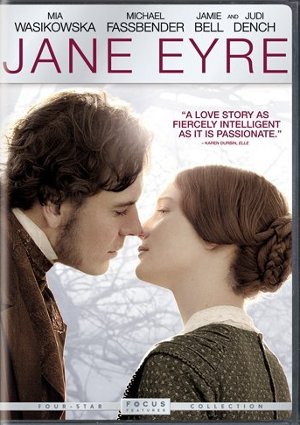- Title: Jane Eyre
- IMDB: link

 Charlotte Brontë‘s novel has been adapted to film more than a dozen times over the years. In the latest, by director Cary Fukunaga and screenwriter Moira Buffini, Mia Wasikowska stars as the title character Jane Eyre, an orphaned child turned governess and teacher, who struggles to find her place in the world.
Charlotte Brontë‘s novel has been adapted to film more than a dozen times over the years. In the latest, by director Cary Fukunaga and screenwriter Moira Buffini, Mia Wasikowska stars as the title character Jane Eyre, an orphaned child turned governess and teacher, who struggles to find her place in the world.
Bronte’s protagonist has long been heralded as the world’s first feminist hero. Jane overcomes (a seemingly never-ending list of) struggles and unhappiness over the course of the tale and battles to stand on her own two feet and only then to embrace love on her terms.
The film jumps between three different timelines in Jane’s life including her life as a child (played by Amelia Clarkson) in her aunt’s house and later at boarding school, her time as the governess at Thornfield Hall for Edward Rochester (Michael Fassbender), and her months with the Rivers family (Jamie Bell, Tamzin Merchant, Holliday Grainger) as a teacher at a country school.
Jane Eyre looks terrific with it’s low lighting and muted tones, and the cast is well-chosen for their roles in a period piece such as this one. Sadly, the storytelling fails in comparison. I’ve never read Bronte’s novel and Fukunaga’s soap opera take on the story isn’t going to make me pick it up anytime soon. Even the performances of its leads can’t keep the script from devolving into little more than gothic melodrama, complete with ghostly voices and a swelling score that often felt unnecessarily forceful and hamfisted.
The extras include a commentary by Fukunaga, deleted scenes, featurettes on Bronte’s tale and characters, as well as the film’s score and use of light and darkness to frame the film’s gothic feel. Those with more appreciation for the novel might get more than I did from the film. Then again, the simplified version of events might just as well lead to even harsher criticism.
